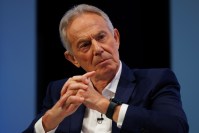What a strange non-event was the stockmarket reaction to the announcement of the latest national lockdown. Retailers, leisure companies, travel firms – all was calm. Marks and Spencer was down half a per cent on the morning, while Next was up five per cent on the back of good online results before Christmas. EasyJet was down two percent but International Airlines Group (IAG) was up 0.4 per cent. Cruise operator Carnival was down 0.7 percent but travel group Tui was up two per cent. It was just like any other day, as if nothing had happened on the Covid front.
But then maybe that is because nothing much had happened. Many of the restrictions were in place already. In tier 4 areas – which had expanded to cover most of the country – shops, bars, restaurants were already closed. Household mixing had already been banned over the whole country for two months. The new restrictions affect the country in the short term, but in the mid to long term will they really do much to change the picture?
Markets have got to the point of ennui. They are behaving as if they have seen it all before, that nothing can shock them now
Markets have got to the point of ennui. They are behaving as if they have seen it all before, that nothing can shock them now. They have swallowed the second wave, the arrival of vaccines, balanced the one against the other and decided that no matter what pain hits us in the short term, in the longer term all will be well.
But what does it mean? There are two ways to interpret what is happening. Firstly, that the bad news has been priced in. Or secondly that markets have been lulled into inaction – in which case it is not impossible that they could take a dive at some point as the world realises that vaccination programmes are not happening fast enough to defend us against many more months, if not years, of disruption to our lives.
Could there come a tipping point soon? On Tuesday, travel company Tui cancelled all its holidays until mid-February – it could scarcely do otherwise, given that the government has effectively banned holidays until then. But if that date keeps on creeping forwards there will be a point at which the travel industry realises that it is looking at a second lost season. Over the past few weeks there has been a presumption that, thanks to vaccines, life will be pretty well back to normal by the summer. Yet in four weeks we have only managed to vaccinate 1.2 million people. At this rate it would take around four years to vaccinate everyone. The rate of progress will surely speed up with the rollout of the AstraZeneca vaccine, but the back-to-normal by summer scenario is beginning to look more dodgy by the day.
Buckingham Palace does not often lead the country, but this week it took the decision to cancel all garden parties for 2021. Over the next few weeks, festival organisers will have to make the same decision: to plough on with events this summer or to write off 2021 just as 2020 was written off. Even if Britain speeds up its vaccination programme it is looking highly unlikely that other countries, many holiday destinations among them, will succeed in vaccinating substantial proportions of their populations by the summer, which will make for many restrictions on movement.
Maybe, the travel and leisure sectors have bottomed out and can only recover from here. But I wouldn’t want to bet against a crunch coming in the next few weeks as the optimism for the summer of 2021 begins to fade.








Comments